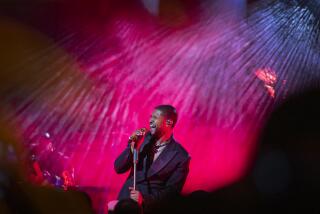Three Performers Have Pop Albums Covered
- Share via
If a twofer is a two-for-one bargain ticket, then a threefer has to be considered an even better buy. And that’s exactly what was on tap Thursday night at the House of Blues, when the venue showcased three first-rate Blue Note Records acts. The program featured guitarists Fareed Haque and Charlie Hunter and saxophonist Everette Harp, all performing selections from their new “cover” albums.
The music represents the ultimate in cross-fertilizing the playing of contemporary jazz musicians with the work of prior songwriters. Haque’s current album, for example, takes a fresh look at the tunes on Crosby, Stills, Nash & Young’s “Deja Vu.” Hunter’s album reworks Bob Marley’s “Natty Dread,” and Harp’s recalls Marvin Gaye’s “What’s Going On.”
Haque, opening the show, put an electrifying spin on songs such as “Carry On” and “Teach Your Children” with a series of solos dominated by his breathtakingly rapid-fire technique. Haque’s dynamic style would appear to make an odd blend with the CSN&Y; tunes, yet the combination worked with surprising success. And his playing, on one number, of an instrument that combined the qualities of guitar and sitar added unusual color and contrast to a performance that generated considerably more energy than the recording upon which it was based.
Hunter’s set was a revelation--intriguing for the Bob Marley tunes, but compelling no matter what he was playing. His five-piece band, which was filled with relatively unknown but immensely talented young players, was one of the most invigorating groups heard in recent months. Hunter convincingly demonstrated that his remarkable guitar playing, in which he simultaneously plays both bass and melody lines on his eight-string instrument, is one of the most singular sounds in jazz. And his ability to create, with drummer Scott Amendola, the timbres of a full rhythm section allowed him to use a solid, three-horn front line (Kenny Brooks, tenor sax; Chuck McKinnon, trumpet; and Calder Spanier, alto sax) in a set of irresistibly rhythmic numbers. With this band, Hunter has real breakout potential.
Harp, a powerful saxophonist whose playing resonates with references to both Grover Washington Jr. and David Sanborn, performed the Gaye tunes with great respect for the originals. Using four vocalists (with a brief guest appearance by Kenny Loggins) and a six-piece backup band, he cruised through the familiar songs without adding any particularly new perspective. At his best, Harp can play with anyone, but in pop-oriented settings such as this, his unwaveringly overheated approach--devoid of any real dynamic variation--can soon be become wearing.
More to Read
The biggest entertainment stories
Get our big stories about Hollywood, film, television, music, arts, culture and more right in your inbox as soon as they publish.
You may occasionally receive promotional content from the Los Angeles Times.










